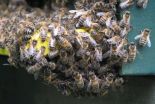(Press-News.org) A joint expedition of scientists led by Chapurukha M. Kusimba of The Field Museum and Sloan R. Williams of the University of Illinois at Chicago has unearthed a 600-year-old Chinese coin on the Kenyan island of Manda that shows trade existed between China and east Africa decades before European explorers set sail and changed the map of the world.
The coin, a small disk of copper and silver with a square hole in the center so it could be worn on a belt, is called "Yongle Tongbao" and was issued by Emperor Yongle who reigned from 1403-1425AD during the Ming Dynasty. The emperor's name is written on the coin, making it easy to date. Emperor Yongle, who started construction of China's Forbidden City, was interested in political and trade missions to the lands that ring the Indian Ocean and sent Admiral Zheng He, also known as Cheng Ho, to explore those shores.
"Zheng He was, in many ways, the Christopher Columbus of China," said Dr. Kusimba, curator of African Anthropology at The Field Museum. "It's wonderful to have a coin that may ultimately prove he came to Kenya," he added.
Dr. Kusimba continued, "This finding is significant. We know Africa has always been connected to the rest of the world, but this coin opens a discussion about the relationship between China and Indian Ocean nations."
That relationship stopped soon after Emperor Yongle's death when later Chinese rulers banned foreign expeditions, allowing European explorers to dominate the Age of Discovery and expand their countries' empires.
The island of Manda, off the northern coast of Kenya, was home to an advanced civilization from about 200AD to 1430AD, when it was abandoned and never inhabited again. Trade played an important role in the development of Manda, and this coin may show trade's importance on the island dating back to much earlier than previously thought.
"We hope this and future expeditions to Manda will play a crucial role in showing how market-based exchange and urban-centered political economies arise and how they can be studied through biological, linguistic, and historical methodologies," Dr. Kusimba said.
###Other researchers who participated in the expedition to Manda include Dr. Janet Monge from the University of Pennsylvania, Mohammed Mchulla, staff scientist at Fort Jesus National Museums of Kenya and Dr. Amelia Hubbard from Wright State University. Also involved was Professor Tiequan Zhu of Sun Yat-Sen University, who identified the coin. The researchers also found human remains and other artifacts that predate the coin.
Photos available upon request.
Ancient Chinese coin found on Kenyan island by Field Museum expedition
2013-03-13
ELSE PRESS RELEASES FROM THIS DATE:
Answering messages behind the wheel is as dangerous as being twice over the limit
2013-03-13
Scientists from various Australian universities in collaboration with the University of Barcelona have compared the effects of mobile use while driving with the effects of alcohol using a simulation. Their experiment demonstrates that using a handsfree kit or sending text messages is the same as being above the legal alcohol limit.
The Australian universities of Wollongong, Victoria, Swinburne of Technology, the Institute for breathing and sleep and the University of Barcelona have measured the reaction capacity behind the wheel of twelve healthy volunteers who participated ...
Immune cells cluster and communicate 'like bees,' researcher says
2013-03-13
The immune system's T cells, while coordinating responses to diseases and vaccines, act like honey bees sharing information about the best honey sources, according to a new study by scientists at UC San Francisco.
"In the morning, each bee goes looking individually for a sugar source, then comes back to the hive and does a dance in front of the other bees describing the location of what it's found, which helps the hive decide collectively where the best source is," said senior scientist Matthew Krummel, PhD, a UCSF professor of pathology.
They don't bust the same ...
UT study identifies ways children can meet recommended activity goals
2013-03-13
KNOXVILLE—Despite overwhelming evidence about the benefits of physical activity for children, most American youngsters are not meeting the federal recommendation of 60 minutes a day.
A new study by a team of University of Tennessee researchers has identified specific ways—and estimated minutes for each approach—that can help children achieve the recommended daily physical activity goal.
The results of various approaches, ranging from mandatory physical education in school to changes in playground designs, were published recently in the American Journal of Preventive ...
Polo takes the bait
2013-03-13
KANSAS CITY, MO—A seemingly obscure gene in the female fruit fly that is only active in cells that will become eggs has led researchers at the Stowers Institute for Medical Research to the discovery of a atypical protein that lures, traps, and inactivates the powerful Polo kinase, widely considered the master regulator of cell division. Its human homolog, Polo-like kinase-1 (Plk1), is misregulated in many types of cancer.
Stowers Investigator and senior author R. Scott Hawley, Ph.D., hopes that this highly selective kinase trap might give drug developers, who are working ...
Medicare spending for advanced cancer not linked to survival differences
2013-03-13
Substantial regional variation in Medicare spending for patients with advanced cancer is not linked to differences in survival, according to a study published March 12 in the Journal of the National Cancer Institute.
Cancer care accounts for approximately 10% of Medicare spending, and costs are highest for cancer patients with late-stage disease. Prior research studies have shown that there are large regional differences in spending within the Medicare program, however it is unknown if higher average regional spending for advanced cancer is linked to improved survival ...
Study: Brain imaging after mild head injury/concussion can show lesions
2013-03-13
SAN DIEGO – Brain imaging soon after mild traumatic brain injury (mTBI) or mild concussion can detect tiny lesions that may eventually provide a target for treating people with mTBI, according to a study released today and that will be presented at the American Academy of Neurology's 65th Annual Meeting in San Diego, March 16 to 23, 2013.
Studies of brain tissue once a person has died have shown that different types of lesions are associated with more severe TBI. "Our study suggests that imaging may be used to detect and distinguish between these lesions in a living ...
Preventing HIV infection with anti-HIV drugs in people at risk is cost-effective
2013-03-13
An HIV prevention strategy in which people at risk of becoming exposed to HIV take antiretroviral drugs to reduce their chance of becoming infected (often referred to as pre-exposure prophylaxis or PrEP), may be a cost-effective method of preventing HIV in some settings, according to a study by international researchers published in this week's PLOS Medicine.
In an analysis of 13 modelling studies led by Gabriela Gomez from the Department of Global Health, Academic Medical Centre, University of Amsterdam/AIGHD in The Netherlands, the authors evaluated the impact of pre-exposure ...
Use of adjunctive antipsychotic medications in depression
2013-03-13
A study published this week in PLOS Medicine finds that while antipsychotic medications are associated with small-to-moderate improvements in depressive symptoms in adults, there is little evidence for improvement on measures of quality of life and these medications are linked to adverse events such as weight gain and sedation.
The results of the study, conducted by Glen Spielmans of Metropolitan State University in St. Paul, Minnesota and colleagues, have potential implications for the treatment of depression by providing clinicians with a better understanding of the ...
Ethical oversight needed for social network health research
2013-03-13
Participant-led research, such as studies conducted via social networks, are increasingly common and have several advantages over more standard research but there are some concerns about their ethical oversight, according to experts writing in this week's PLOS Medicine.
Effy Vayena from the University of Zurich in Switzerland and John Tasioulas from University College London argue that the distinctive nature of such participant-led research means that the standards of ethical oversight should be adapted to strike a balance between protecting the interests of research ...
Implementing e-health in Malawi
2013-03-13
In low-income countries a substantial challenge in planning and delivering healthcare is the accurate assessment of disease burden. In this week's PLOS Medicine, Miguel SanJoaquin from the University of Malawi College of Medicine and colleagues describe their experience of implementing an electronic patient record system in a large referral hospital in southern Malawi. The system, known as Surveillance Programme of IN-patients and Epidemiology (SPINE), is used to record patient details during consultations and this data can be used to monitor changing patterns of disease ...


